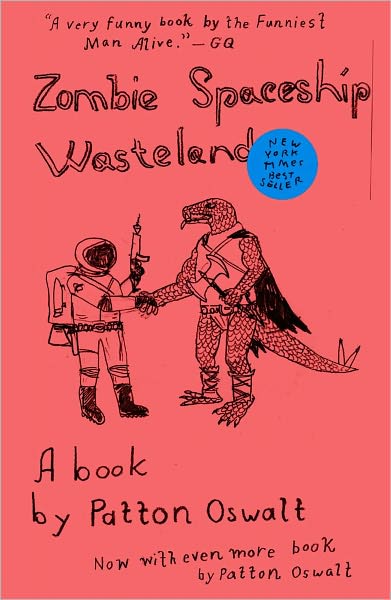Zombie Spaceship Wasteland: A Book by Patton Oswalt
Patton Oswalt (2011)
Maybe that makes my generation unique—the one that remembers before MTV and after . . . and then before the Internet and after. The generation I see solidifying itself now? They were born connected—plopped out into the late nineties, into the land of Everything That Ever Was is Available from Now on.
We’ll always cherish the stark, before-and-after culture shift of our adolescence. We had isolation . . . and then access. Drought and then deluge. Three channels and then fifty. CBs and then chat rooms. And our parents didn’t have time, in the beginning, to sift through the “Where is all of this new stimulus coming from?” and decide what was beyond our emotional grasp.
Of course, “justify my immobility” was just “fool myself” with exactly triple the syllables.

It was all part of my plan (I said to myself) to eventually end up a writer. If writing for Gent magazine led Stephen King to The Stand, then emceeing a weekend at Sir Laffs a Lot would lead to my writing this boss novel I had in my head about a dude who battles mutants in a wasteland.
I had to go back and reread the page a few times. As I read it, I kept drifting out of the book, out of the booth, and coasting on the green crest of the song, to the momentary idea that any point on Earth was mine for the visiting, that I’d lucked out living in the reality I was in. And I also got the feeling I was souring and damaging that luck by enjoying the contentment of pulling the shades on the sun, and shutting out my fellow employees and the world, and folding myself up in the construct of a brilliant novel like The Man in the High Castle, that all the reading I’d been doing up to this point hadn’t enhanced my life, but rather had replaced and delayed it.
Decades later, when I took LSD in a tiny apartment in San Francisco, I had a realization. Most narcotics are designed to approximate the nonjudgmental, magically incorrect way we see the world before we can speak.
Hard-core comic book readers often became film snobs later in life (they spend their adolescence reading, essentially, storyboards).
McManus met his end on the balmy evening of May 2, 1912, when he mistook the Happy Cat Tooth Powder mascot painted on the front of an onrushing streetcar for a bartender who had recently refused him service. McManus charged and promptly disappeared in a spray of knuckles and vomit.
And it’s the same with stand-up. Yes, I sifted through a lot of garbage in the late eighties and early nineties. But there were always unexpected moments of transcendence and originality. And knowing they were hidden in strip malls made me feel like I was a member of one of the last mystery cults on Earth. Like when the Fat Doctor said, one night’s at Garvin’s, “I used to work on the suicide hotline but I got fired. People would call up and I kept seeing their point.” Then there was Mark Fineman, who said, half to himself, “I don’t need to curse to do comedy. But I need to curse to live.” Hell, Lord Carrett’s non sequitur “You know they won’t let you buy a gun if you’re crying?” inspired a Holly Golightly song.
|



